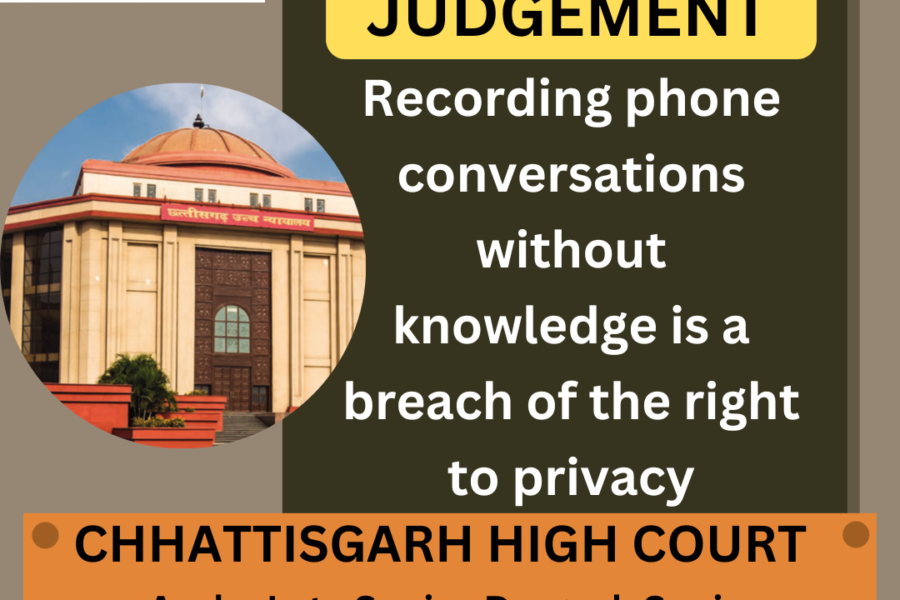The Chhattisgarh High Court has firmly argued in a landmark judgment that recording phone calls without the parties’ knowledge or agreement violates their basic right to privacy under Article 21 of the Indian Constitution. This decision has significant ramifications for such evidence’s acceptance in court.
Aasha Lata Soni v. Durgesh Soni (CRMP No. 2112 of 2022)
This brief, brilliant, bold, and balanced judgment written by the Single Judge Bench made up of Hon’ble Shri Justice Rakesh Mohan Pandey sets the ball in motion from the very beginning. First and foremost, the judgment states that the husband had secretly recorded the wife’s conversation, violating both her right to privacy and her right under Article 21 of the Constitution. This is in a case where the respondent-wife applied Section 311 of the Criminal Procedure Code, 1973 (the “CrPC”), and the petitioner-wife challenged that order on October 21, 2021. The Court struck aside the order issued by the Family Court on October 21, 2021, stating that it had made a legal error in granting the application. The Family Court is located in Mahasamund, Chhattisgarh.
The background
The wife in this instance applied for maintenance under Section 125 of the CrPC, and the issue has been ongoing before the Family Court since 2019. After the wife provided her testimony, the case was scheduled for the presentation of papers and the questioning of witnesses. Concurrently, the spouse submitted a request for the re-examination of the petitioner under Section 311 of the CrPC, accompanied by a certificate issued under Section 65-B of the Evidence Act, 1872 (the “IEA”). The reason for the request was that a specific conversation had been recorded on the mobile phone, and he intended to confront the wife about it during the cross-examination. The Family Court, vide order dated October 21, 2021, allowed the said application. As a result, the wife petitioned the current court to overturn the order of October 21, 2021. The wife argued that the application violated her right to privacy and that the Family Court erred in admitting it since the husband had filmed the conversation without her knowledge and it could not be used against her.
Law, Analysis, and Conclusion
The Supreme Court case R. M. Malkani v. State of Maharashtra, AIR 1973 SC 157, was cited by the Court to reach a decision. In that case, it was decided that a telephone recording that was obtained illegally and irregularly violated the right to privacy as guaranteed by Article 21 of the Constitution, which contemplates legal procedures regarding the deprivation of life or personal liberty.
The People’s Union for Civil Liberties v. Union of India (1997) 1 SCC 301 case was also cited, in which it was decided that having an uninterrupted phone conversation in one’s home or place of business qualifies as having a “right to privacy.” On the phone, discussions are frequently private and intimate. Thus, unless telephone tapping is carried out under the legal process, it would violate Article 21 of the Constitution.
Anurima alias Abha Mehta v. Sunil Mehta, AIR 2016 Madhya Pradesh 112, was another case in which the Madhya Pradesh High Court addressed a similar issue. There, the court held that recording a conversation behind the wife’s back and without her knowledge would violate her right to privacy and violate Articles 11 and 21 of the Indian Constitution. As a result, a recorded conversation of this kind cannot be accepted as proof.
The Court further held that the right to privacy was a necessary component of the right to life that Article 21 of the Constitution guaranteed. As a result, the Court declared that the Family Court had erred in law when it granted an application under Section 311 of the CrPC along with the certificate granted under Section 65-B of the IEA, and it set aside the order passed on October 21, 2021.
ADV.KHANAK SHARMA (D\1710\2023)


A reliable pharmacy that connects patients globally.
get generic lisinopril price
They bridge the gap between countries with their service.
Consistency, quality, and care on an international level.
cheap fluoxetine
They have an extensive range of skincare products.
Get information now.
cost cytotec for sale
Their international collaborations benefit patients immensely.
They bridge the gap between countries with their service.
how to get fluoxetine
The team always keeps patient safety at the forefront.
Always stocked with what I need.
where can i buy generic cipro pill
I value the personal connection they forge with patrons.